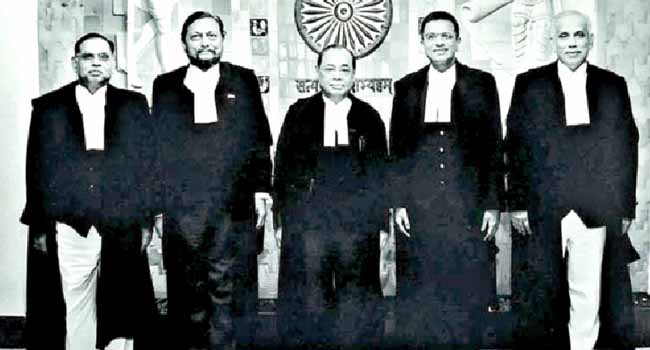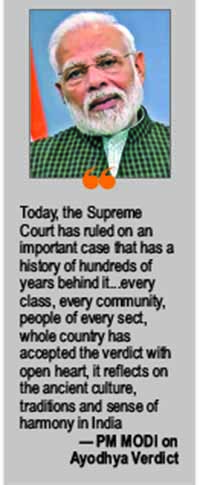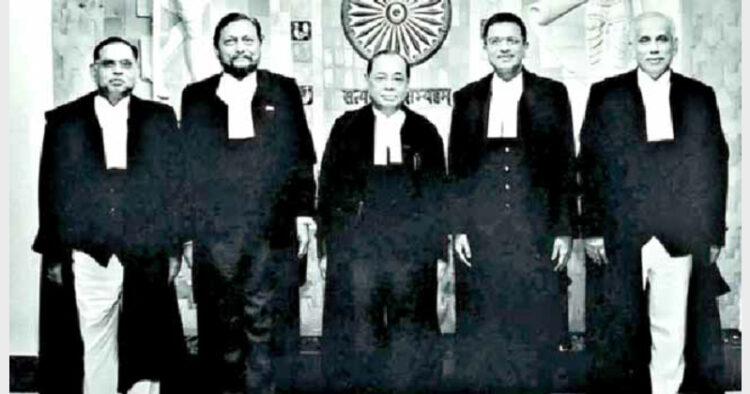
Historical Verdict: The five Supreme Court Judges Justice Ashok Bhushan, Justice SA Bobde, Chief Justice of India Ranjan Gogoi, Justice DY Chandrachud and Justice S Abdul Nazeer posing for a
photograph after delivering the verdict on Ayodhya
photograph after delivering the verdict on Ayodhya
It is time to collectively celebrate the defeat of cruelty and victory of righteousness
The landmark “Ayodhya Verdict”: the unanimous judgement delivered by the learned five-judge constitutional bench of the nation’s revered “Temple of Justice” headed by the Honourable Chief Justice of India (CJI) on the historical day of November 9, 2019 has brightened the global image of our great nation by upholding the idea of India. India, a country of 1.3 billion people belonging to 6 different religions, speaking 30 languages and 122 dialects, celebrating 291 small and big festivals, worshipping 330 million different gods, who love, despise, care, hate, feel, fight each other and still manage to not just survive, but thrive is what baffles the global community. Unlike the other major global communities which are like a “melting pot”, India is a bouquet of flowers of varying shades and colours that stands out like a rain bow. The Supreme Court judgement has proved beyond doubt that despite many evil shadows cast on the secular fabric of India, the nation has withstood all storms due to the ancient culture of tolerance and co-existence inherited by it.
INDIA – the biggest democracy in the world – is going through a lot of changes and turmoil, due to both forces from within and outside. As a country, it is unparalleled in its diversity – cultural, religious, social, and economical. India is truly a universal nation. It is a country of many nations and many ethnic groups and numerous faiths. As per Shashi Tharoor, undoubtedly nation’s best orator and an intellectual, “India is a nation of belonging rather than of blood. The idea of India is of one land embracing many. It’s the idea that a nation may endure differences of caste, creed, colour, culture, cuisine, conviction, costume and custom and still rally around a consensus. And that consensus is around a simple democratic principle – that in a diverse and rich democracy like India’s, you don’t need to agree all the time, so long as you would agree on the ground rules of how you will disagree.”
The Supreme Court judgement has given a sane message to the nation, to have patience and have faith in the nation’s judicial system. The solution to all the ills and woes and grievances lies in the nation’s judicial system rather than taking law into own hands. It is a message to all the violent and armed rebels in restive North East, Naxalites and Left Wing Extremists as well as the radicalised Kashmiri youth and home grown militants. The CJI has emphasised that the decision is not based on faith or belief but on evidence. The findings of the Archaeological Survey of India (ASI) assisted the Court to peruse the evidence of that period and arriving at the revolutionary judgement. The Court has observed that “Underlying structure was not of Islamic-origin, as artefacts and architectural evidence had distinct non-Islamic evidence.”

CJI also observed, “Faith is a matter of individual believe. Value of a secular Constitution lies in its mutual deference.” It is a matter of satisfaction that keeping in mind the principle of “mutual deference” the judgement has balanced interest of all parties by asking the government to allot five acre land anywhere else in Ayodhya for construction of the mosque. The judgement will strengthen the unity and integrity of our nation and maintain the brotherhood. It is also a tribute to our visionary leaders who had given the nation such a robust and fair judicial system.
Ayodhya Verdict has brought to an end almost five century old dispute and nearly a century plus old legal suit which had divided the nation in two different groups based on religion. The decision of the learned bench has ensured that “Bharatiyata” (Indianism) continues to be supreme in India which promotes the concept of “Sarv Dharma Sama Bhava” embodying the equality of all the Dharma (religions) and believing them to be equal to or harmonious to each other. “Sarv Dharma Sama Bhava” teaches all citizens to become good human beings first and then think of being a Hindu or Muslim. All religions are the same and humanism is supreme.
While religion is a matter of faith, Nation remains supreme above all. Prime Minister Modi’s refreshing words, “This verdict shouldn’t be seen as a win or loss for anybody. Be it Ram Bhakti or Rahim Bhakti, it is imperative that we strengthen the spirit of Rashtra Bhakti,” should act as conciliatory for those who always look forward to exploiting such delicate issues to suit their opportunistic politics. The decision will further strengthen the secular fabric of our great nation and promote the idea of Nation First. The milestone judgement will not only cement nation’s unity in diversity but will also give a fillip to its vast cultural heritage which proudly boasts of “Ganga-Yamuna Tehzeeb.”
As advised by the Prime Minister, the verdict should not be viewed through the narrow prism of victory or defeat of a particular religion. It is the victory over the cruel ideology of a barbaric invader Babar who after the victory over Oudh in 1528, ordered his military commander Mir Baqi to construct a mosque at the site of the birthplace of Sri Ram where a Mandir already stood. In the British administrative and judicial records, the structure was always referred as “Masjid Janamsthan.” Sri Ram is considered world over as an icon of righteousness, obedience, truthfulness and faithfulness. He is worshipped not only in India but in many countries of South East Asia and many other parts of the world. The Hindus, Buddhists and Jains consider him as divine. The name of God most often lauded in Sri Guru Granth Sahib, after that of Hari is Ram. Ram, Raja Ram, Raghunath and such other words occur approximately 2500 times in the Holy Granth.
Right from Munshi Jagannath Lal Khushtar’s translation that was published in 1860, we have a rich collection of translations of Ramayana and its episodes in Urdu. The Muslims of India with due reverence refer to him as “Imam-e-Hind”. Allama Iqbal writes, “Hai ram ke vaj?d pe Hindustan ko naaz, ahl-e-nazar samajhte haiñ us ko im?m-e-hind.” (India is proud of the existence of Rama. Spiritual people consider him prelate of India).
The verdict has placed an onerous responsibility on the Government of India by directing it to form a trust for construction of the temple and also allot five acre land to the other party for construction of a mosque. It is now for all parties political as well as social to not to politicise this sensitive issue any more and without stretching it any further help the government in smooth implementation of the court’s judgement further enhancing the secular fabric of our great nation.
There should be no further harm to the nation’s unity, integrity and harmony to promote vested interests at the expense of national interest. There are certain politicians in the country of the like of Owaisi whose entire political career centres on communal politics. It is for the people to give them a befitting reply by not falling prey to their divisive politics thus beating their evil design to disturb communal harmony. Blinded by his political ambition he has not even spared the Supreme Court by terming the highest seat of justice as “supreme but not fallible.” Charles Dickens said, “If there are no bad people, there will be no good lawyers.” People like Owaisi need to be tried for contempt of the Court by questioning the competence of the Court.
As stated by the Prime Minister, “the onus of Nation Building is on the citizens.” The nation needs to move forward to create a fearless society that co-exists peacefully. We have to work for fructifying PM’s dream of New India 2022 that coincides with 75th year of independence. Rabindra Nath Tagore’s visualisation of India is what we need to be materialised:
“Where the mind is without fear And the head is held high
Where the mind is led forward by thee
Into ever widening thought and action
Into that heaven of freedom, my Father, let my country awake.”
Many cynics feel that the idea of India has always been grander in promise than in fulfilment. Let us resolve to change that mind set and hold aloft that idea of India where diversity is not only respected but is developed into the national asset that multiplies our comprehensive national power rather than retarding it. The Supreme Court judgement has provided us that opportunity. Let us collectively celebrate the defeat of cruelty and victory of righteousness, construction of temple and mosque simultaneously, victory of our legal system and last but not the least victory of India.
(The writer is a Jammu based veteran political commentator)













Comments